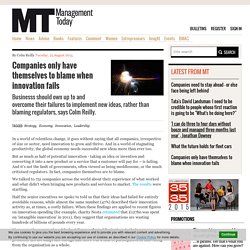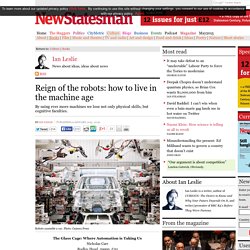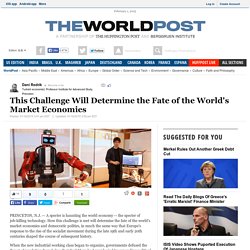

Explicit cookie consent. AP IMPACT: Recession, tech kill middle-class jobs. NEW YORK (AP) — Five years after the start of the Great Recession, the toll is terrifyingly clear: Millions of middle-class jobs have been lost in developed countries the world over.

And the situation is even worse than it appears. Most of the jobs will never return, and millions more are likely to vanish as well, say experts who study the labor market. What's more, these jobs aren't just being lost to China and other developing countries, and they aren't just factory work. Increasingly, jobs are disappearing in the service sector, home to two-thirds of all workers. They're being obliterated by technology. Why companies not governments and regulators are to blame for innovation failure. By Colm Reilly Tuesday, 25 August 2015 In a world of relentless change, it goes without saying that all companies, irrespective of size or sector, need innovation to grow and thrive.

And in a world of stagnating productivity, the global economy needs successful new ideas more than ever too. But as much as half of potential innovation - taking an idea or invention and converting it into a new product or a service that a customer will pay for – is failing. Cutting unemployment: How governments should help those on the dole. Quantitative easing site:economist.com. Can smart machines take your job? AP Left: the General Services Administration telephone switchboard and its operators in 1951.

Ten million jobs at risk from advancing technology. Overall, workers in London are seen as being safer than those in the rest of the UK, with the study predicting 30pc of jobs will go in the capital.

This is because London has fewer manufacturing jobs – a sector likely to face greater automation – as well as a higher proportion of jobs which are creative or require greater skills and knowledge that are less susceptible to being taken on by machines because they cannot replicate human thought. Angus Knowles-Cutler, London senior partner at Deloitte, said: “Technological advances are likely to cause a major shift in the UK labour market in the coming decades. Reign of the robots: how to live in the machine age. The Glass Cage: Where Automation is Taking Us Nicholas CarrBodley Head, 299pp, £20 The Second Machine Age: Work, Progress and Prospetiry in a Time of Brilliant Technologies.

Erik Brynjolfsson and Andrew McAfeeWW Norton, 320pp, £17.99. Welcome to Forbes. This Challenge Will Determine the Fate of the World's Market Economies PRINCETON, N.J. -- A specter is haunting the world economy -- the specter of job-killing technology.

How this challenge is met will determine the fate of the world's market economies and democratic polities, in much the same way that Europe's response to the rise of the socialist movement during the late 19th and early 20th centuries shaped the course of subsequent history. When the new industrial working class began to organize, governments defused the threat of revolution from below that Karl Marx had prophesied by expanding political and social rights, regulating markets, erecting a welfare state that provided extensive transfers and social insurance, and smoothing the ups and downs of the macroeconomy.
In effect, they reinvented capitalism to make it more inclusive and to give workers a stake in the system. Today's technological revolutions call for a similarly comprehensive reinvention. Lousy recoveries: No one (important) wants faster growth. La BCE lance un avertissement aux politiques. Le Monde.fr | • Mis à jour le | Par Marie Charrel Comme largement anticipé par la communauté financière, la Banque centrale européenne (BCE) n'a pas dégainé son « Quantitative easing » (QE), son arme suprême pour lutter contre le risque déflationniste.

La BCE prête à assouplir sa politique monétaire dès le mois de juin. La décision de la BCE de laisser son principal taux directeur à 0,25 % était largement anticipée par le marché. - AFP De notre correspondant à Francfort Comme prévu, la Banque centrale européenne (BCE) a laissé son principal taux directeur inchangé, à 0,25 %.

Mario Draghi, son président, a toutefois créé la surprise en présentant la « bande-annonce » de la réunion suivante de politique monétaire, prévue en juin : le conseil des gouverneurs de la BCE est « à l’aise pour agir la prochaine fois », a-t-il déclaré sans équivoque lors de la conférence de presse, suivant la réunion mensuelle de la BCE, délocalisée à Bruxelles. La raison qui a poussé le banquier italien à autant s’épancher tient à la persistance d’une inflation basse, en dépit d’une appréciation modeste au mois d’avril, à 0,7 %, après 0,5 % en mars. US and Mexico boost manufacturing credentials. Challenging year forces Brazil to rethink growth strategies. Brazil’s growth story: not a happy one – beyondbrics.
ECB professes alarm over falling inflation but still holds fire. The eurozone current account surplus reached 3.6pc of GDP in the last quarter of 2013, which is pushing the currency higher.

Hans Redeker, currency chief at Morgan Stanley, said efforts to talk down the euro against these powerful forces have failed repeatedly. “It will take QE to really weaken the euro,” he said. Mr Draghi said the governing council is perplexed by the relentless slippage in the inflation rate. It is examining whether there are deep global causes that go beyond the recent fall in energy and food prices.